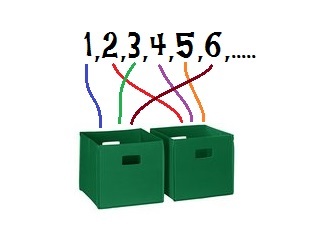Fibonacci Bins

The numbers 1 through (inclusive) are separated into 2 bins.
For each bin, no two different numbers in it can add up to a Fibonacci number .
The Fibonacci numbers are given by:
And in general they satisfy the following recursion relation:
- for
What is the largest for which this is possible?
If you think the answer is infinite, please put 99999 as your answer.
Image credit: http://www.shopstyle.com/
The answer is 99999.
This section requires Javascript.
You are seeing this because something didn't load right. We suggest you, (a) try
refreshing the page, (b) enabling javascript if it is disabled on your browser and,
finally, (c)
loading the
non-javascript version of this page
. We're sorry about the hassle.
0 solutions
No explanations have been posted yet. Check back later!